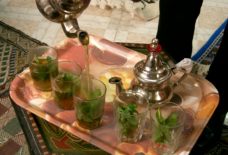Arab American Writer Lawrence Joseph Keeps Memories of Old Store Alive
The long-abandoned building at 5770 John R looked like thousands of other abandoned buildings in Detroit.
Graffiti and weeds gradually covered its broken facade. The front door remained locked, but the side door was open, so anyone could go in and do whatever they wanted.
Yet this building was different than thousands of other decaying, anonymous buildings in the city. This building has a recorded history.
All buildings were important, busy places, but few of them leave any trace of the love, commerce, production, brutality and other human activity that transpired within their walls.
But 5770 John R spawned a writer, Lawrence Joseph, whose poems and prose are well-known in American literary circles. And over the years he has chronicled the smells of salt pork and the brown light and the Silver Satin wine of Joseph’s Market, which his grandfather, father and uncle ran from 1937 to 1972.
He writes of tenement-style buildings in the neighborhood and the sound of music coming from an apartment window.
“I lift crates of okra and cabbages, let down crates of buttermilk and beer, bring live carp to the scale, and come, at last, to respect the intelligence of roaches in barrels of bottles,” Joseph wrote in a poem titled “There I Am Again.”
The store, at the corner of Hendrie, was on a busy street one block south of the Ford Freeway and a few blocks north of the Detroit Institute of Arts. Before the freeways, it sat in the midst of Detroit’s main African-American community.
Joseph’s family was Catholic and of Lebanese and Syrian ancestry, and its members were part of a long tradition of Mideastern storeowners in Detroit.
“It’s a building a lot of people saw,” he said last week. “Metaphorically, it stands for all the small markets, the racial and class negotiations that went on, and then you add the Arab thing. It represents Detroit.”
The neighborhood became poorer as the years went on, and the market became caught up in the violence that began wracking Detroit. In the early 1960s, a young thief slashed his uncle’s throat.
Joseph later wrote: “He shows you the scar; it’s healed. ‘You learn how to forget,’ he reminds you.”
A junkie shot his father, Joseph Joseph, Feb. 2, 1970. “The bullet missed his spinal cord, miraculously, the doctor said. Everything eventually would be all right. The event went uncelebrated among hundreds of felonies in the city that day.”
On the first night of the 1967 riot, looters ransacked the store. Lawrence Joseph wrote about his father driving away after inspecting the damage: “Take the canned peaches, take the greens, the turnips, drink the damn whiskey spilled on the floor, he might have said.
“Though fire was eating half Detroit, Joseph could only think of how his father, with his bad legs, used to hunch over his cutting board alone in light particled with the sawdust behind the meat counter, and he began to cry.”
Lawrence Joseph, 60, grew up in Royal Oak, attended the University of Detroit High School and University of Michigan for undergraduate studies and law school. He lives in New York with his wife, Nancy Van Goethem, an artist who grew up in Detroit. He teaches law at St. John’s University.
Joseph left Detroit in 1981 but visits periodically, and said he is amazed at how the city keeps disappearing, how “suddenly whole blocks are gone.”
Now Joseph’s Market is gone: The city demolished it Oct. 1. But the building still lives in Joseph’s words. As he wrote in “Just That”:
“You wait and see. That language doesn’t work/anymore, its century is over. It turns out/Joseph’s Market is as free as the boy with one arm/kissing the tangerine my father gives him./The entire place — upside down. Only money/And credit move around, part of the future.”
Bill McGraw
Detroit Free Press
Picture caption:
The Joseph Market as it looked in the mid-1950’s.



